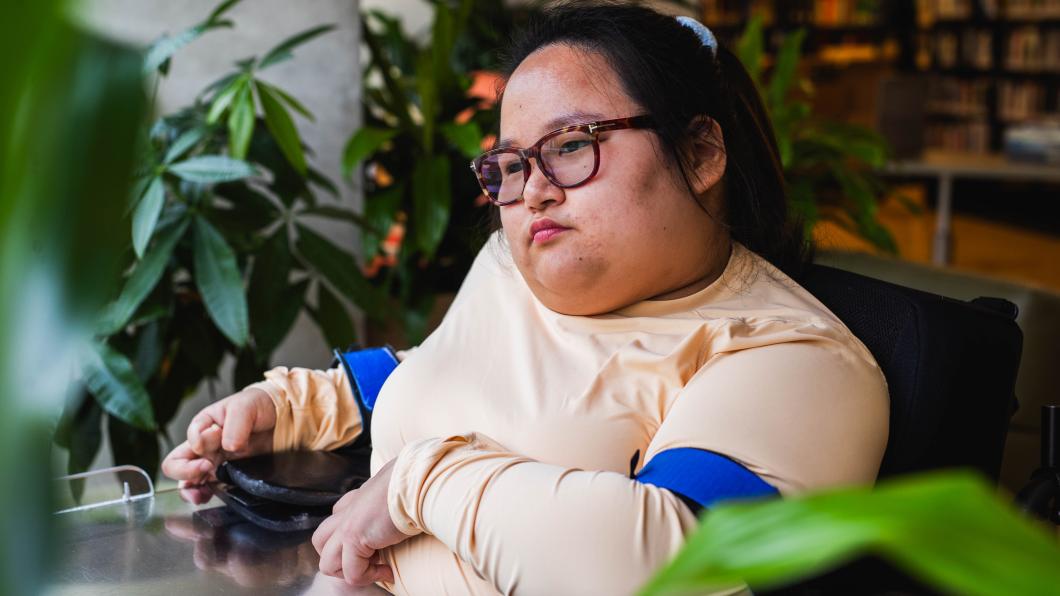
Ontario's adult health system falls short for disabled youth
By Louise Kinross
Turning 18 should be a party, but for youth with disabilities it's often described as falling off a cliff.
That's because they age out of a coordinated system of pediatric health care and into a fragmented adult health system that wasn't designed for them.
Two-thirds of 802 Ontario young adults with disabilities and caregivers reported the adult system was failing to meet their needs in a new survey by Leger commissioned by Holland Bloorview. Five hundred disabled Ontario adults aged 18 to 30 and 302 caregivers completed the survey. Results are found in a hospital report called Turning 18 isn't so sweet.
Over half of participants reported having to purchase health services privately, with more than 70 per cent saying their medical costs increased. Forty-seven percent of caregivers said costs increased by over $6,000 a year.
Over 50 per cent of caregiver respondents said their young adult continued to rely on pediatric clinicians because they couldn't find help in the adult system. And almost half of young adults reported experiencing negative attitudes from adult care providers—such as feeling judged, ignored, or being treated as inferior. Forty-one per cent of caregivers doubt the adult system will adequately support their child when they are unable to provide care themselves.
Youth with disabilities move from a coordinated system of pediatric care—sometimes under one roof—to fragmented services. It's "like a shopping mall, except the shopping mall has one store that's open at weird times and is five hours away from your house," says Rachel Kwok, 21, in the report. "Now, I have to go to five different places for everything that I need. The fact that my care is not in a centralized place makes it difficult to arrange scheduling and keep track of everything."
Participants reported not being able to find specialists, clinics and family doctors with the disability expertise they need, and one-third wait three years to get a family doctor. Twenty-eight per cent feel their doctors don't understand childhood disability.
Dilshad Kassam-Lallani, a nurse practitioner in the spina bifida and spinal-cord injury program at Holland Bloorview, sees this first hand. Her clients with spina bifida have the advantage of being referred to a young adult transition program at Vibrant HealthCare Alliance in Toronto, an adult community health centre, where she is cross-appointed.
Even so, "I'm finding it can take three years for the clients I see at Vibrant to find primary care, and we need to support them during that interval," Kassam-Lallani says. "The second issue is that if they find a provider who doesn't have a good understanding of their condition, there's frustration felt by our young adults and their families. They'll often reach out to me, and I have to do a lot of complex service coordination on their behalf and help them navigate the system."
Most young adults and families in Ontario do that advocacy on their own.
“Our partnership with Vibrant allows for continuity of spina-bifida care and transition support up until age 25, at which time there is full brain development and young adults are well situated in the adult healthcare system,” Kassam-Lallani says.
That continuity of care is something Holland Bloorview envisions for all young adults with disabilities in Ontario.
According to the survey, lack of disability knowledge in adult providers was more prevalent in rural settings.
Seven-seven per cent of young adults faced one or more barriers to care. In addition to negative attitudes, a third didn't receive medical information in formats that were accessible to them. Almost one-quarter encountered inaccessible buildings and equipment. For example, they couldn't get through narrow doors and hallways, use the washroom, because it was inaccessible, or get onto an exam table, because it lacked a lift. Fourteen per cent couldn't find accessible transportation to get to their appointments.
"Julian's only way to access healthcare is through me, because he doesn't have the right supports in place for his appointments," says Donna Cappelli, mom to Julian, 23. "He says it affects his independence as an adult who can advocate for himself, when you always have your mother in the room with you."
Julian relies on 60 hours of support worker time each week. He and his family pay for 51 of those hours, because only nine hours are covered through government funding. Support workers enable Julian to volunteer at Holland Bloorview, the Toronto International Film Festival and Hot Docs, and to follow his passion as a foodie influencer. He regularly gets out to try new cuisine at restaurants and posts about it on his social media channels.
According to the Holland Bloorview survey, managing an uncoordinated, fragmented system has forced young adults and their parents to cut back on work and education hours because they can't balance it all.
Sixty-four per cent of adults reported their health-care needs limit their participation in everyday activities. For example, 87 per cent don't always have a support worker or family member to safely go out and socialize with friends. Almost 40 per cent can rarely or never access life skills development or day programs.
Holland Bloorview is advocating for coordinated, continuous services by adult providers who have specialized training in disability, and for holistic, lifelong care that extends beyond the medical to education, employment, social inclusion and overall wellbeing.
The hospital's vision is "an integrated system of care where no youth is transitioned out of pediatric care until comprehensive equivalent care is secured, irrespective of disability type, socio-economic status or geographic location."
Learn more about how you can raise awareness and advocate for policy reform at Holland Bloorview's It's No Piece of Cake campaign.
Like this content? Sign up for our monthly BLOOM e-letter, follow BLOOM Editor @LouiseKinross on Twitter, or watch our A Family Like Mine video series.